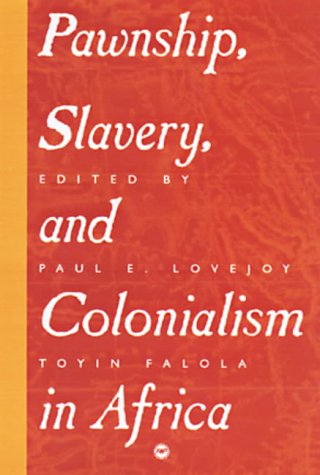

Most ebook files are in PDF format, so you can easily read them using various software such as Foxit Reader or directly on the Google Chrome browser.
Some ebook files are released by publishers in other formats such as .awz, .mobi, .epub, .fb2, etc. You may need to install specific software to read these formats on mobile/PC, such as Calibre.
Please read the tutorial at this link: https://ebookbell.com/faq
We offer FREE conversion to the popular formats you request; however, this may take some time. Therefore, right after payment, please email us, and we will try to provide the service as quickly as possible.
For some exceptional file formats or broken links (if any), please refrain from opening any disputes. Instead, email us first, and we will try to assist within a maximum of 6 hours.
EbookBell Team

4.7
66 reviewsThese essays also explore how the pressure of the international slave trade, especially along the West African coast further shaped the institution of pawnship and allowed the extension of credit into the interior of West Africa. Far from ending the practice of pawnship, European colonial rule set in motion new demands on the economies and societies of Africa, assuring the continuation of pawnship well into the Depression of the 1930s.
Since the nature of pawnship was such that women and children—the most vulnerable relatives—were often offered as surety of food, money, or other goods advanced on credit, this study also contributes to a gendered analysis of work and production in Africa, demonstrating the close links between credit, servility, and gender in the history of large parts of Africa from the sixteenth to the twentieth century.
The volume includes studies of pawnship along the West African coast, in Igboland, the Niger Delta, the Kingdom of Benin, Yorubaland, Asante and the Gold Coast, East Africa, Sierra Leone and Liberia, and the western Sudan.
Common terms and phrases
Abeokuta Amoke Opaaiye Asante Ashanti Ashanti Law Atlantic Slave Trade Benin Bolaji interview Bolaji/Bolaji interviews borrowed British chiefs cocoa cocoa farm colonial contract courts creditor Dahomey debtor District economic Egba enslavement European evidence export Falola famine female pawns Ghana girls Gold Coast History Ibadan Ibid Igbo Ijaye Ilorin imprisonment for debt institution interest iwofa iyoha Johnson kinship labor Lagos Law and Constitution lineage loan London Lovejoy male pawns marriage master merchants Miji Kenda missionaries NAGA ADM NAGK Nembe Niger Nigeria nineteenth century Nupe Obuasi Office Old Calabar Oroge Oseni Saidu panyarring parents pawnship period person pledge political practice precolonial Province Rabai Rattray redeem redemption relations Report Richard Rogers Robin Law Saadu Mania Sessional Papers ships Sierra Leone slave trade slavery Slavery in Africa slaves and pawns social society sold suggests Town transactions West Africa Whydah women Yoruba Yorubaland